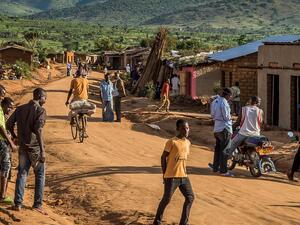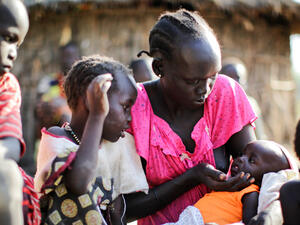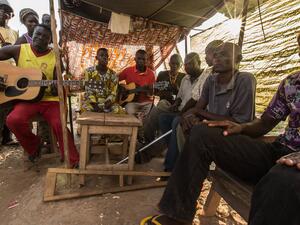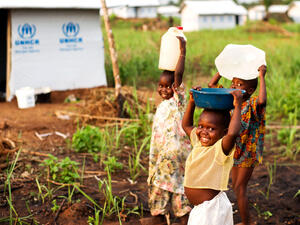High Commissioner marks Africa Refugee Day
High Commissioner marks Africa Refugee Day
High Commissioner Sadako Ogata is marking Africa Refugee Day today at a settlement for Sudanese refugees in Mungula, near Adjumani in northern Uganda. Around 11,500 refugees who fled southern Sudan in 1994 live at the site, one of 55 where the government of Uganda and UNHCR are co-operating in a self-reliance project launched last year to reduce the refugees' dependence on continued international assistance. Mrs. Ogata and Prime Minister Apollo Nsibambi opened a new wing of a secondary school, one of the basic community services UNHCR is supporting in refugee settlement areas. The government is giving refugees plots of farmland to promote self-sufficiency in food.
The High Commissioner met yesterday with Ugandan President Yoweri Museveni and thanked him for Uganda's generosity toward refugees. Uganda hosts 202,000 refugees, over 183,000 from Sudan. Most of the Sudanese refugees have been in Uganda since 1983. The two discussed the pressing issues of peace in the Democratic Republic of Congo, current relations between Rwanda and Uganda and their effect on population displacement in the Great Lakes. As in her meeting with Rwandan President Paul Kagame on Saturday, Mrs. Ogata expressed concern for the stability of the region.
Between Rwanda and Uganda, the High Commissioner visited Burundi. Discussions there, including at a Monday meeting with President Buyoya, centred on the prospects for the return of some 350,000 Burundi refugees from Tanzania, as expectations of a breakthrough at peace talks led by former South African president Nelson Mandela rise. On her departure from the country, the High Commissioner however said that there would have to be tangible improvements in the security situation before UNHCR could promote repatriation to Burundi.
On Monday, the eve of Africa Refugee Day, the governments of Kenya and Ethiopia as well as UNHCR met in Nairobi and signed an agreement that should pave way for the repatriation of some 5,400 Kenyan refugees who have been in southern Ethiopia since 1992. The operation will commence in August 2000 and is scheduled for completion before the end of September. A repatriation convoy was stopped at the border last November by the government of Kenya, which raised last-minute concerns for security in northern Kenya, the refugees' area of return. The refugees had sought asylum in neighbouring Ethiopia in May 1993 after Kenya's first multi-party elections in December 1992 provoked ethnic fighting in north-eastern Kenya. Ethiopia is one of the four top refugee hosting countries in Africa, with 338,000 refugees, including 285,000 Somalis.








